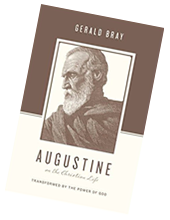Back to series


Recommended Reading:

Download or Listen to Audio
Augustine on Heaven and Rewards
Click here to open a Print - Friendly PDF
Many Christians are greatly indebted to John Calvin for his articulation of our faith. Our final authority of course is God’s revelation, Holy Scripture, but Calvin and other sixteenth-century Reformers have given us a helpful theological lens through which we can better understand the Bible in a historically orthodox way.
We may be less aware of how indebted we also are to Saint Augustine. Many of the theological convictions we take for granted—for example, how we think about original sin, anthropology, God’s grace, the nature of the church, the Holy Trinity, the relationship between church and state, and “just war” theories—were first formulated with clarity by Augustine in the late fourth and early fifth centuries (A.D. 354–430).
Calvin tried to recapture an Augustinian orthodoxy, which he believed had become muddled in the Middle Ages. In his Institutes of the Christian Religion, Calvin quoted Augustine more than any other church father or theologian, and he spoke of him usually (though not always) in an authoritative way. Calvin understood himself, largely, as an Augustinian Christian.
Two themes that surface in Augustine’s sermons may be helpful for our discipleship: understanding (1) salvation as primarily a process, a pilgrimage that is completed only in the future at our final destination, heaven, and (2) future rewards as a motivating factor for present godliness.

Augustine, the Preacher
We usually think of Saint Augustine as philosopher or theologian. He was a prolific writer and his admirers today quote most often from his carefully argued treatises and his polemical pieces. Yet in his own day, Augustine was best known as a pastor. He preached nearly ten thousand sermons over the course of his lifetime.
Churches were jammed when word spread that he was in town presiding, as priest or bishop. Nearly 550 of Augustine’s sermons have been preserved today, spanning the course of his ministry, from his early years as a new priest (A.D. 393) right up to his death (A.D. 430).
Salvation as Process and Future Focused
Like many of the church fathers, Augustine often referred to the Israelites’ crossing of the Red Sea as a paradigm for Christian salvation. Just as Israel, after crossing the Red Sea, needed to press on to reach the Promised Land, so too with us.
“There remains after baptism,” Augustine preached,
the crossing of the desert, by a life that is lived in hope, until we come to the promised land, to the land of the living where God is our portion, to the eternal Jerusalem; until we get there, the whole of this life is the desert for us, the whole of it a trial and temptation.1
To those who had gone through an extensive catechesis process, sometimes lasting over a year, and who were soon to be baptized, Augustine said, “It is to this salvation that you are hastening, all of you that have given in your names for baptism; a salvation, a welfare, not for a short time but for eternity … What we are doing in this life: we are now hoping for what we are to receive afterward.”2
Salvation, Augustine says, is a process, a journey, a pilgrimage. Each Christian is traveling to a final destination, the heavenly Jerusalem. The journey begins at baptism, but it is not finalized until one reaches heaven, at death.
From here each of us has the end of going home. We end in the place we are going to. So now then, here we all are, engaged in life’s pilgrimage, and we have an end we are moving toward. So where are we moving to? To our home country. What is our home county? Jerusalem, mother of the faithful, mother of the living.3
 The Christian’s discipleship is to focus on the future: Think not “about how much ground you have covered but about how much you still have left until you finish the journey and can enjoy yourself in your home country.”4
The Christian’s discipleship is to focus on the future: Think not “about how much ground you have covered but about how much you still have left until you finish the journey and can enjoy yourself in your home country.”4
One is always to hold in mind one’s final destination.
Our future hope is central to Augustine’s understanding of salvation: “Anyone who doesn’t think about the age to come, and is not a Christian precisely in order to receive what God promises at the end, is not yet a Christian.”5 And again, “Everything we think about, we should be thinking about in relation to the future life.6
What, for Augustine, is the role Jesus Christ plays in our salvation? He discusses Christ’s role in redemption in some of his sermons. But when encouraging his congregants to have faith in Christ, Augustine emphasizes clinging to Christ in the present as the “Way” to move forward on one’s journey and awaiting one’s full communion with Him in the future arrival in heaven, forever united to Him. Christ’s past work on the cross for us is less of the focus for Augustine than is Christ’s present and future presence in our lives.
In fact, a primary motivating factor for Christians is continual reflection on future communion with Christ in heaven. Our various loves here on earth are but precursors to our love of, and future full union with, Christ.
He is keeping himself for those who love him. He wants to show his face to those who have purified, not their eyes of flesh but the eyes of their hearts (Matt. 5:8). Love in order to see … You will see him who made whatever else you love … Love him absent, to enjoy him present. Long to hold him, to embrace him. First cling to him by faith, then afterward you will cling to him by sight. Now, as a traveler, you are walking by faith and by hope. When you arrive, you will enjoy him whom you have loved as you traveled on your journey.7
 In sermon after sermon, Augustine encourages his listeners to keep before them their future hope. This world most definitely is not our home; God in Christ saves the Christian out of it and eventually brings one to one’s true home.
In sermon after sermon, Augustine encourages his listeners to keep before them their future hope. This world most definitely is not our home; God in Christ saves the Christian out of it and eventually brings one to one’s true home.
While it is true that in his epic The City of God, Augustine has many good and constructive things to say about this earth (the City of Man), and indeed Christian political scientists have derived much help from him in 3 Augustine on Heaven and Rewards their thinking about government, nevertheless, in his sermons to beleaguered and suffering laity, Augustine’s over-arching emphasis is on the afterlife. This present difficult life is to be persevered in because of the future joy that awaits us. Here are a few samples of this repeated theme from Augustine, as found in his sermons:
Consider seriously, how much we should love eternal life, when this miserable life, that’s got to end anyhow some time, is loved so dearly … So you love this life, do you, in which you struggle, and run around, and bustle about and gasp for breath; and you can scarcely count the things that have to be done in this wretched life: sowing, plowing, planting, sailing, grinding, cooking, weaving. And after all this, your life has got to end anyhow … So learn, brothers and sisters, to seek eternal life, where you will not have to endure these things, but will reign with God forever.8
It is for love of this world, after all, that people slave away at all their affairs. But as for you, see you slave away at all your good works, not for love of this world but for the sake of the eternal rest that God promises you.9
What we have set our hopes on, brothers and sisters, is nothing in this age, nor in this world, nor anything to do with this kind of success that dazzles people who are forgetful of God. The first thing we have to realize and keep firmly in mind as Christians is that we did not become Christians in order to obtain the good things of this present life, but to obtain goodness knows what else, that God is already promising us, and that we human beings cannot yet grasp (I. Cor. 2:9).10
Let us love eternal life, and let us gauge how hard we ought to strive for eternal life, from the way in which we see people who love this temporary life that is bound to end sometime strive so hard for it.11 [A Lenten Sermon] Don’t let’s say, “Let’s eat and drink, for tomorrow we die” (I. Cor. 15:32) but rather, “Let’s fast and pray, for tomorrow we shall die.”12
Be on our toes and ready as we look forward to the last things … It’s for these expectations and on account of this hope that we have become Christians. But in fact our hopes are fixed on this world, aren’t they? Let’s stop loving the world. We have been called from love of this world, to hope for and cherish another world … Why do we look for good days on earth, where we can’t possibly find them … With what diligence, what labor, what trouble, what vigilance, what effort people seek to live a long time here and to grow old. But what, in fact, does a long time amount to, but running to the end of the race? … You want to walk, and you don’t want to get anywhere … Certainly, certainly seek life, seek good days; but let them be sought where they can be found.13
Seeking God’s Promised Future Rewards
Holy Scripture is filled with God’s promise of future rewards. Here are a few examples. In his sermons Augustine discusses them all, especially 2 Timothy 4:7–8.
When you pray, go into your room and shut the door and pray to your Father who is in secret. And your Father who sees in secret will reward you. (Matt. 6:6) 14
Do not lay up for yourselves treasures on earth, where moth and rust destroy and where thieves break in and steal, but lay up for yourselves treasures in heaven, where neither moth nor rust destroys and where thieves do not break in and steal. (Matt 6:19–20) 14
Whoever gives one of these little ones even a cup of cold water because he is a disciple, truly, I say to you, he will by no means lose his reward. (Matt. 10:42)
For it will be like a man going on a journey, who called his servants and entrusted to them his property … And he who had received the five talents came forward, bringing five talents more, saying, “Master, you delivered to me five talents; here I have made five talents more.” His master said to him, “Well done, good and faithful servant. You have been faithful over a little; I will set you over much. Enter into the joy of your master.” (Matt. 25:14, 20–21)
When you give a dinner or a banquet, do not invite your friends or your brothers or your relatives or rich neighbors, lest they also invite you in return and you be repaid. But when you give a feast, invite the poor, the crippled, the lame, the blind, and you will be blessed, because they cannot repay you. For you will be repaid at the resurrection of the just. (Luke 14:12–14)
By faith Moses … considered reproach of Christ greater wealth than the treasures of Egypt, for he was looking to the reward. (Heb. 11:23, 26)
I have fought the good fight, I have finished the race, I have kept the faith. Henceforth there is laid up for me the crown of righteousness which the Lord, the righteous judge, will award to me on that Day, and not only to me but also to all who have loved his appearing. (2 Tim. 4:7–8)
Many Christians struggle with robustly exulting in the notion of God giving His children rewards, thinking that this necessarily or inevitably contradicts a theology of grace. Doesn’t any mention of rewards automatically infer human pride? Augustine’s answer always is the same: no, not if one is convinced that the abilities one has for obeying the Lord are all God’s gifts from Him in the first place. In his debate with Pelagius, Augustine’s oft-quoted refrain was “God, command what You will, and then give what You command.” Augustine understands “crowns” as God’s “crowning His gifts.” He says,
You he crowns with compassion and mercy; and even if your merits have preceded you, God says to you, “Have a good look at your merits, sort them out carefully, and you will see that they are my gifts” … When you depart from here you will receive according to what you deserve, and you will rise again to receive what you have achieved. Then God will set the crown, not so much on your merits as on his gifts. Whatever he has given you, if you have kept and preserved it, he will recognize. 15
Augustine’s favorite biblical passage on rewards was 2 Timothy 4:7–8. (See above.) Here is how he understands the dynamic that is taking place when one obeys God and is later rewarded for it.
The Lord, he says, will award me a crown, being a just judge. So he owes me what he will award; so the just judge will award; having inspected the work, after all, he can’t deny the reward … But with the reward you do nothing; with the work, you don’t act alone. The crown simply comes to you from him; the work on the other hand comes from you, but only with him helping … To Paul fighting the good fight, completing the course, keeping the faith, he paid back good things. But for what good things? For ones he himself had given. Or wasn’t it by his gift that you were able to fight the good fight? … The only things of yours that we know were prepared for you by yourself are evil. So when God crowns your merits, he is not crowning anything but his own gifts. 16
Augustine’s understanding of the believer’s sanctification is that God has intentionally given commands, with corresponding consequences, which the grace-depending Christian can—and must—obey and then be rewarded for. Indeed, this notion is at the very heart of a life lived out in faith. In a sermon preached in the middle of his career, around A.D. 410, at a church somewhere between Carthage and Hippo, Augustine said,
What God commands us to believe, he doesn’t offer now to our sight; the reason he doesn’t do so is so that faith may have a reward. I mean if he showed it to you directly, what merit would there be in your believing it? It wouldn’t in fact be believing, but seeing . . . And when our Lord and Savior Jesus Christ comes, who is preached or having already come now in such a way that his coming again is also expected, he will come with due payments for both believers and unbelievers, ready to give believers their rewards, to dispatch unbelievers into eternal fire. 17
But Augustine goes even further. Since God has set up this pattern of God’s grace → human obedience → God’s rewards, Augustine admonishes Christians for thinking that the process of salvation somehow does an end-run around the need for obedience. God’s reward is offered in response to obedience. Given that God’s grace is the first, central, and necessary empowerment, Augustine has no hesitation in exhorting Christians to obey in order to receive the award (or “win the prize”).
Augustine preaches,
Who doesn’t want life? And yet who wants to keep the commandments? If you don’t want to keep the commandments, why look for life? If you are slack about the work, why be in such a hurry for the salary? … This life is still giving you time; don’t spurn reproof. You were a thief yesterday; don’t be one today … Be done with evil some time or other, and for the sake of the reward carry out the good. You want to have good things, and you don’t want to be good; your life is in contradiction to your wishes. 18
In fact, when Christians, by God’s grace, do in fact obey God’s commands, they should be bold in expecting the reward! “At harvest time they will say to their Lord, ‘Lord, with your help we have done what you commanded; render what you promised.”19
Jesus Christ is the paradigm for the Christian’s understanding of sanctification. Our life is one of imitation, and yet, more than that, one of union with Christ, so that we are united with Him now in His (and thus our) sufferings, and one day in the future we will be united with Him in His resurrected life of joy and peace. In a sermon preached near the end of his life at Easter to the newly baptized infantes (i.e., new adult Christians), Augustine says,
His cross … He chose the worst possible kind of death, so that his martyrs might not dread any kind of death … That was his work, to be crucified; the sign of his work, the cross, the reward of his work, the resurrection … What is the work? Obedience. What is the reward? Resurrection without death. 20
 So the Christian is to strive, through God’s grace, to obey God’s commands, with God’s future rewards as one’s motivation. In a sermon preached in Carthage in A.D. 419, Augustine says, “The prize of our faithfulness is your God. He is what you will get, he is preparing himself as the reward of his worshippers …
So the Christian is to strive, through God’s grace, to obey God’s commands, with God’s future rewards as one’s motivation. In a sermon preached in Carthage in A.D. 419, Augustine says, “The prize of our faithfulness is your God. He is what you will get, he is preparing himself as the reward of his worshippers …
He it is who is the reward of your faith and fidelity. You greedy misers, what will ever satisfy you if God himself doesn’t?”21 And again, “We shall see God. God himself will be our vision; the vision of God will be the reward of this faith.”22
What Augustine Can Teach Us
There are two ways in which Augustine’s theology challenges us theologically.
A Long View of Salvation
First, for many Christians, the central defining point in all of Christianity is the cross of Christ. We rightly revel in looking back to Christ’s death as the turning point of all history and thus the turning point of our lives. Two thousand years ago, at Christ’s death, our sins were forgiven, we were justified, and we were united with Christ. And our new life of regeneration, our new identity as sons and daughters of God, and our receiving of the Holy Spirit, all can be traced back to Calvary and Pentecost—the first century.
All of New Testament ethics, Anglican pastor and scholar John Stott once said, can be summed up in four words: “Be Who You Are.” Remember who you are in Christ—and then live like it. Continually remember, remember, remember all that has happened for you and in you, due to that singular event two thousand years ago. You have been saved, Calvin would exhort us, so live out your present and future life through remembering, by faith, who Christ is and what he has done.
Augustine would not disagree with the importance of Christ’s death for the Christian. But he would have us spend as much or more time also reflecting on Christ’s resurrection, ascension, and future judgment of the world. We must look for Christ not only in His past work of redemption, Augustine insists, but also in His present work of sanctification and His future awaiting of our arrival in heaven. The Christian should not merely look back but must also look ahead. (The celebration of the Lord’s Table is a time for the church not only to look back at Christ’s death, but also to look forward to His second coming and our future banquet with Him at the consummation of the ages.)
This is not to suggest that some have no theology of hope or heaven. But is it possible to emphasize salvation so strongly in the past tense that the Christian’s current journey is seen almost as an afterthought or fait accompli? Sometimes an overemphasis on our having been saved can belittle a focus on our being saved now, in the present, and on our future destination, where we one day will be saved. When the Israelites were wandering in the desert for forty years after having crossed the Red Sea, sometimes Moses exhorted them to think back on what God had done in redeeming them from slavery in Egypt; but he also sometimes encouraged them to think ahead to the Promised Land to which they were journeying, a land flowing with milk and honey.
For many of us, justification is the central defining concept; both sanctification and glorification are seen as but its subsets and inevitable consequences. In fact, for many Christians, justification is synonymous with salvation. But for Augustine, salvation, not justification, is the controlling theological framework. Justification, sanctification, and glorification are all subsets of salvation.
When the metaphor of salvation-as-journey-to-heaven is allowed to coexist with the metaphor of salvation-aspast- rescue-from-sin, a more holistic theological balance can be achieved in the way we understand salvation as a whole.
A Proper View of Heaven
A second way that we can benefit from Augustine’s pastoral theology is in the priority he places on the Christian’s good works and their relation to heaven and heaven’s rewards. What a human being does in response to God’s grace really matters to Augustine—in fact, it is a matter of heaven and hell. Since the drama of salvation is a process finalized only at death, our moral choices along our pilgrimage are not mere icing on the cake of an already finished state, but truly significant players in the successful completion of our journey.
Even though Jesus often speaks of rewards as one way of motivating His flock, many of us become uneasy with such thinking, assuming (often unconsciously) that our doing something that merits some kind of reward from God automatically rules out grace and inevitably involves pride. But at the end of the ages, Jesus will say one of two things to every person—either, “Depart from Me, for I never knew you,” or, “Well done, My good and faithful servant.” (Note: Jesus will not say to the Christian, “Well done, Holy Spirit in you,” but, “Well done, Sally; well done, Jim. You have been faithful!”)
Somehow, we must be able to do two things simultaneously in our understanding of salvation: (1) affirm the importance of the Christian’s obedience, holiness, and moral choices, insisting that our choices reap real and serious consequences, and (2) glory in Jesus Christ and His grace, where we can say with full exuberance that God has saved us, God is saving us, and God one day will save us.
|
Notes: |
|||

Kevin Offner
InterVarsity StaffKevin Offner, has been on staff with InterVarsity for 31 years, serving students in New England and now the metro Washington DC area. He currently oversees faculty and graduate student ministry on 4 campuses in Washington, DC. Kevin is interested in orthodox Christian theology across a wide spectrum of traditions, seeking agreement without compromise.

Recommended Reading:
Gerald Bray, Augustine on the Christian Life: Transformed by the Power of God (Crossway, 2015)
Augustine is widely considered to be the most influential theologian in church history after the apostle Paul. Dramatically converted from a life of licentiousness to one of wholehearted devotion to Christ, the humble North African pastor quickly established himself as a leading figure within the ancient church. In Augustine on the Christian Life, historian Gerald Bray explores the rich spirituality of this extraordinary man, examining his historical context, approach to the Christian life, and work as a preacher and teacher of God’s Word. Drawing on Augustine’s many writings—including his classic spiritual autobiography, the Confessions—Bray demonstrates Augustine’s enduring relevance for Christians today. This book is part of Crossway’s Theologians on the Christian Life series.
 COPYRIGHT: This publication is published by C.S. Lewis Institute; 8001 Braddock Road, Suite 301; Springfield, VA 22151. Portions of the publication may be reproduced for noncommercial, local church or ministry use without prior permission. Electronic copies of the PDF files may be duplicated and transmitted via e-mail for personal and church use. Articles may not be modified without prior written permission of the Institute. For questions, contact the Institute: 703.914.5602 or email us.
COPYRIGHT: This publication is published by C.S. Lewis Institute; 8001 Braddock Road, Suite 301; Springfield, VA 22151. Portions of the publication may be reproduced for noncommercial, local church or ministry use without prior permission. Electronic copies of the PDF files may be duplicated and transmitted via e-mail for personal and church use. Articles may not be modified without prior written permission of the Institute. For questions, contact the Institute: 703.914.5602 or email us.
-
Recent Podcasts
A Welcome Change in Apologetics
by Randy Newman, Aimee Riegert on April 19, 2024We’re burdened for our friends who don’t know...Read More
-
Questions That Matter Podcast – Samuel James and Digital Liturgies
by Samuel James, Randy Newman on April 19, 2024
-
The Side B Stories – Dr. James Tour’s story
by Jana Harmon, James Tour on April 12, 2024
-
Recent Publications
Isn’t Morality Relative?
by Christopher L. Reese on April 1, 2024It is widely accepted in the Western world...Read More
-
Do Muslims and Christians Worship the Same God?
by Andy Bannister on March 1, 2024
-
Artificial Intelligence and Its Impacts on Humanity
by John Lennox on February 13, 2024
0
All Booked
0.00
All Booked
0.00
All Booked
22140
GLOBAL EVENT: Keeping the Faith From One Generation To Another with Stuart McAllister and Cameron McAllister, 8:00PM ET
https://www.cslewisinstitute.org/?event=global-event-keeping-the-faith-from-one-generation-to-another-with-stuart-mcallister-and-cameron-mcallister-800pm-et&event_date=2024-05-17®=1
https://www.paypal.com/cgi-bin/webscr
2024-05-17

Next coming event
Days
Hours
Minutes
Seconds
GLOBAL EVENT: Keeping the Faith From One Generation To Another with Stuart McAllister and Cameron McAllister, 8:00PM ET
On May 17, 2024 at 8:00 pmSpeakers

Kevin Offner
InterVarsity Staff
Team Members

Kevin Offner
InterVarsity StaffKevin Offner, has been on staff with InterVarsity for 31 years, serving students in New England and now the metro Washington DC area. He currently oversees faculty and graduate student ministry on 4 campuses in Washington, DC. Kevin is interested in orthodox Christian theology across a wide spectrum of traditions, seeking agreement without compromise.






